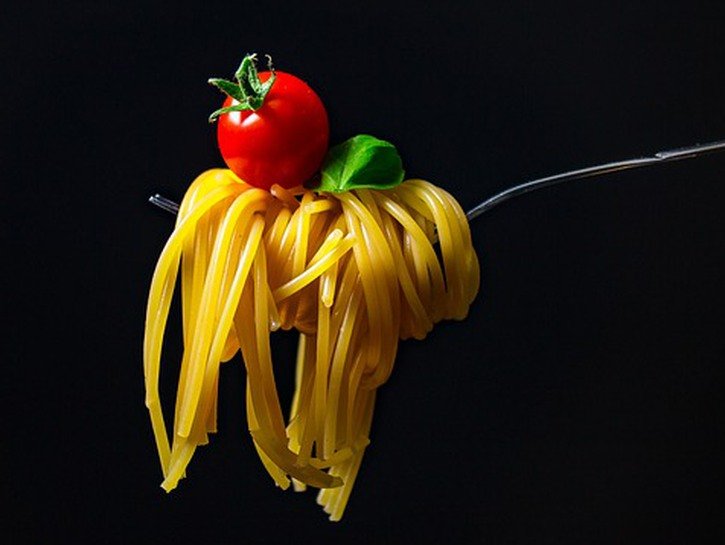Anyone can cook spaghetti, right? It seems simple enough to throw together: Toss some noddles in a pot of boiling water, cook, mix in your choice of sauce, and call it a day. Cooking spaghetti is rather straightforward. Or is it? I know what you’re thinking — How in the world does someone mess up pasta? Simple. Your spaghetti could end up as a flavorless, sticky hot mess. Not convinced? Follow these tips to get the perfect bowl of spaghetti every time!
11 Spaghetti Cooking Hacks
1. Add Enough Water

If you’re planning on cooking a pound of spaghetti, use six quarts of water in a large pot to cook your pasta. Using a liberal amount of water to cook your spaghetti is essential for a few reasons:
- Large volumes of water return to a boil quicker when you add pasta
- Large volumes of water are more convenient for submerging longer kinds of noodles, such as spaghetti.
- Large volumes of water diminish some sticking of the noodles by quickly boiling away the small amounts of starch from the pasta’s surface.
2. Don’t Forget To Stir

It’s essential that you remember to stir your spaghetti within the first couple of minutes of cooking. If you skip this step, your pasta will likely fall victim to its sticky starch, which acts like an adhesive. When you avoid stirring your spaghetti, the pasta will touch and, “glue,” together forming unwanted clumps.
3. Avoid Grabbing The Olive Oil

Perhaps this tip may be slightly confusing to some — because they’ve been adding olive oil to the boiling water of pasta, as a way to prevent sticking and boil overs their entire lives and its worked out fine.
Fact:
- olive oil does prevent boil overs
- olive oil does prevent sticking of noodles
However, olive oil will make greasy noodles, thus making it more difficult for flavorful sauces to penetrate the spaghetti — the result is a flavorless dish. Stop using olive oil and instead:
- use a larger pot
- use more water
- remember to stir
- turn down the heat
4. Salt Your Water

Add one tablespoon of kosher salt per quart of water.
Add a liberal amount of salt to your pot of water once it has come to a boil. Allowing the water to come to a boil and then adding the salt ensures that the salt can infuse the water without affecting the boiling time. The water should be as salty as the ocean, but don’t worry about the amount of salt, most of it will go down the drain once you’re finished cooking. An ample amount of salt gives the spaghetti wonderful flavor as it absorbs liquids.
5. Reserve Some Pasta Water

Don’t pour all of that precious starchy pasta water down the drain. What a waste! There are plenty of great ways to utilize leftover pasta water. Saving at least a cup will enable you to add some splashes to your favorite sauce. The starch in the water will improve the sauce by helping it bind to the noodles more effectively, paving the way for a more decadent dish.
6. Don’t Rinse Your Spaghetti

Rinsing spaghetti noodles is a big no-no! You’re essentially washing away remaining starch on the surface of the pasta, which could have been an effective way of adhering sauce to the pasta.
7. Cook Sauce In A Skillet

If you’re cooking the sauce in a saucepan, try switching it up and use your skillet. You’ll find that the sauce cooks more evenly than it would in a saucepan, which allows the sauce to thicken quickly. The width of the pan and shallow sides make it more accessible to combine the sauce with the spaghetti.
8. Don’t Let Spaghetti Cool

Once you strain the spaghetti out of the water, don’t set it aside. As the spaghetti cools, the starch on the surface of the pasta crystalizes creating a barrier. Once you add it to your sauce, it won’t absorb as it should.
9. Finish Cooking Spaghetti In Its Sauce

Try straining the spaghetti out of the water with a ladle-type strainer or spider four minutes before the cook time noted on the pasta package. Place the spaghetti into the skillet with the sauce and continue cooking until the spaghetti is al dente, firm but not soft. Bring the spaghetti back to a boil after adding the spaghetti, then reduce to a simmer until finished cooking.
10. Add Sugar

Adding a touch of sugar to your spaghetti sauce will tone down the acidity and cut through any bitterness.
11. Prepare A Homemade Spaghetti Sauce

Instead of purchasing a storebought spaghetti sauce, prepare a homemade sauce to your tastes with simple, fresh ingredients. Making homemade spaghetti sauce is affordable, manageable, and healthy. Check out four great homemade spaghetti sauce recipes, that you can make for your dinner today.
Taking the time to apply these simple tips and tricks, will help you master the best dish of spaghetti you’ve ever had.
